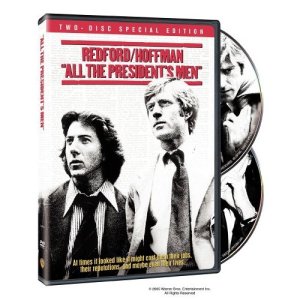It wouldn’t be a major Watergate anniversary without prominent references to the heroic-journalist myth — that risible, media-centric view that the Washington Post’s reporting exposed the crimes that brought down Richard Nixon’s presidency.
Risible?
For sure.

Not exactly, Jerry Ford
Not even the Post’s Watergate principals embraced the heroic-journalist interpretation. As Bob Woodward, one of the newspaper’s lead Watergate reporters, proclaimed in an interview in 2004:
“To say that the press brought down Nixon, that’s horse shit.”
Such pointed disclaimers notwithstanding, the myth seems as robust as ever in the run-up to next week’s 50th anniversary of the break-in at the Watergate complex in Washington, D.C. The burglary touched off a spiraling scandal.
Any more, even the Post drinks the heroic-journalist Kool-Aid.
For example, in its obituary the other day about Barry Sussman, the newspaper’s Watergate editor who died June 1, the Post said of Woodward and his reporting partner, Carl Bernstein:
“Their incremental and inexorable revelations of the political sabotage, corruption and coverup that began with the Watergate break-in helped send numerous Nixon associates to prison and ultimately precipitated Nixon’s resignation on Aug. 9, 1974.”
The article did not explain exactly how newspaper reporting “precipitated Nixon’s resignation.”
Of course, newspaper reporting didn’t have that effect. As Katharine Graham, the Post’s publisher during the Watergate period, said in an interview 25 years ago at the old Newseum in northern Virginia:
“Sometimes, people accuse us of ‘bringing down a president,’ which of course we didn’t do, and shouldn’t have done. The processes that caused [Nixon’s] resignation were constitutional.”
Quite so.
As I discussed in my media-mythbusting book, Getting It Wrong, unraveling the Watergate scandal “required the collective if not always the coordinated forces of special prosecutors, federal judges, both houses of Congress, the Supreme Court, as well as the Justice Department and the FBI.
“Even then,” I noted, “Nixon likely would have served out his term if not for the audiotape recordings he secretly made of most conversations in the Oval Office of the White House. Only when compelled by the Supreme Court did Nixon surrender those recordings, which captured him plotting the cover-up” of the break-in at Democratic National Committee headquarters on June 17, 1972. Five men wearing business suits were arrested in the burglary at the Watergate complex.
Deep in the Post’s obituary about Sussman appearing a revealing passage about his assessment of Woodward and Bernstein.
“I don’t have anything good to say about either one of them,” Sussman was quoted as having said years earlier, after Woodward and Bernstein had spurned his idea about co-writing a book about Watergate. Woodward and Bernstein’s double-bylined memoir about their Watergate reporting, All the President’s Men, was a best-seller in 1974.

The movie helped make the myth
The book and the cinematic version of All the President’s Men placed Woodward and Bernstein at the decisive center of Watergate’s unraveling and, as such, contributed mightily to the emergence and tenacity of the heroic-journalist trope.
References to the heroic-journalist interpretation have appeared elsewhere in the run-up to the 50th anniversary. An article posted yesterday at CNN declared, for example, that Woodward and Bernstein’s “groundbreaking Watergate reporting … led to the resignation of former President Richard Nixon in 1974.”
And a columnist for the New York Post — discussing the bitterness these days at the Washington Post — invoked Watergate’s heroic-journalist narrative in setting up his essay, writing:
“Two dogged reporters patiently dig into the details of a strange burglary at Democratic Party headquarters, diligently assemble facts, cultivate sources and put together a package of revelations that will lead to the first presidential resignation in history.”
Left unexplained was just how the “package of revelations” led “to the first presidential resignation in history.”
But it’s not difficult to understand why references to the heroic-journalist myth are appearing in the run-up to what is a milestone anniversary. The myth offers a convenient way of explaining the essence of Watergate — that Nixon was forced to quit — while sidestepping the scandal’s formidable tangles and complexity.
After all, media myths, invariably offer trite and simplistic versions of history.
More from Media Myth Alert:
- How ‘alone’ was WaPo in reporting emergent Watergate scandal? Not very
- WaPo review indulges in myth, claims Bernstein’s ‘work brought down a president’
- Pumping up Watergate’s heroic-journalist myth
- The ‘newsroom where two reporters took down a president’? Sure it was
- WaPo’s ‘myths about Watergate’ article ignores the scandal’s best-known mythical narrative
- The Nixon tapes: A pivotal Watergate story that WaPo missed
- Katharine Graham, the ‘Economist,’ and bringing down Nixon
- WaPo ‘broke the Watergate scandal’? No way
- WaPo ‘played pivotal role’ in Watergate? Think again
- No, Politico: WaPo didn’t bring down Nixon
- Why Trump-Russia still is not Watergate redux
- Mythmaking in Moscow: Biden says WaPo brought down Nixon
- ‘Follow the money’: A made-up Watergate line
- ‘Getting It Wrong’ wins SPJ award for Research about Journalism

[…] their dogged reporting of the Watergate scandal, Washington Post reporters Bob Woodward and Carl Bernstein uncovered the crimes that forced […]
[…] latest burst of self-congratulatory hoopla about Watergate and the Washington Post subsided weeks ago, with the 50th anniversary of the foiled break-in that set off the […]
[…] mystery, and Media Myth Alert — no friend of the notion that Bernstein and Woodward’s reporting brought down Nixon — doesn’t believe the Post intentionally entered a false […]